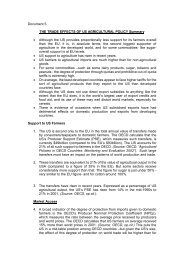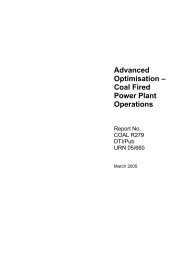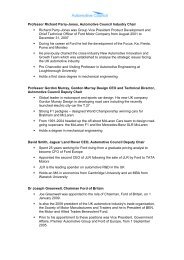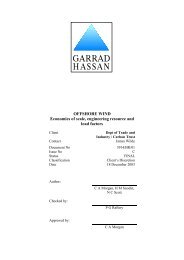Corporate Social Responsibility - A Government ... - DTI Home Page
Corporate Social Responsibility - A Government ... - DTI Home Page
Corporate Social Responsibility - A Government ... - DTI Home Page
Create successful ePaper yourself
Turn your PDF publications into a flip-book with our unique Google optimized e-Paper software.
<strong>Corporate</strong> <strong>Social</strong><br />
<strong>Responsibility</strong><br />
A <strong>Government</strong> update<br />
www.csr.gov.uk
The <strong>Government</strong> has an<br />
ambitious vision for <strong>Corporate</strong><br />
<strong>Social</strong> <strong>Responsibility</strong><br />
To see UK businesses taking<br />
account of their economic, social<br />
and environmental impacts, and<br />
acting to address the key sustainable<br />
development challenges based on<br />
their core competences wherever<br />
they operate – locally, regionally<br />
and internationally.<br />
2<br />
Our strategy for advancing our vision is to:<br />
c Promote business activities that bring simultaneous<br />
economic, social and environmental benefits<br />
c Work in partnership with the private sector, community<br />
bodies, unions, consumers and other stakeholders<br />
c Encourage innovative approaches and continuing<br />
development and application of best practice<br />
c Ensure we have decent minimum levels of performance<br />
in areas such as health & safety, the environment and<br />
equal opportunities<br />
c Encourage increased awareness, open constructive<br />
dialogue and trust<br />
c Create a policy framework which encourages and<br />
enables responsible behaviour by business<br />
This supports the <strong>Government</strong>’s strategy for sustainable<br />
development, with its aims of integrating our objectives<br />
on social progress, effective protection of the environment,<br />
prudent use of natural resources and high and stable levels<br />
of economic growth and employment to ensure a better<br />
quality of life for everyone, now and for generations to come.<br />
We want to encourage business practices that help to ensure<br />
successful and profitable companies and that also contribute<br />
fully to achieving our sustainable development goals.<br />
“Today, corporate social responsibility goes far beyond the old philanthropy of the past – donating money to<br />
good causes at the end of the financial year – and is instead an all year round responsibility that companies<br />
accept for the environment around them, for the best working practices, for their engagement in their local<br />
communities and for their recognition that brand names depend not only on quality, price and uniqueness<br />
but on how, cumulatively, they interact with companies’ workforce, community and environment. Now we<br />
need to move towards a challenging measure of corporate responsibility, where we judge results not just<br />
by the input but by its outcomes: the difference we make to the world in which we live, and the contribution<br />
we make to poverty reduction.” Gordon Brown, Chancellor of the Exchequer
Foreword<br />
Since I became Minister for CSR in<br />
May 2002 we have seen rapid growth in<br />
interest in the application and implications<br />
of CSR. What has impressed me most has<br />
been the level of creativity and enthusiasm<br />
brought to the subject from all quarters.<br />
We’ve seen encouraging progress. I’d<br />
like to highlight some significant recent<br />
developments and look at where we<br />
need to focus for the future.<br />
We see CSR as the business contribution to sustainable<br />
development. There are many definitions but we are all<br />
talking about how business takes account of its economic,<br />
social and environmental impacts in the way it operates –<br />
maximising the benefits and minimising the downsides. But<br />
we are not talking about altruism – CSR should be good for<br />
long-term business success as well as good for wider society.<br />
The growth of the global economy has seen benefits across<br />
the world but also increasing public concern about business<br />
activities and a decline in trust. At the World Summit on<br />
Sustainable Development (WSSD) in Johannesburg in<br />
September 2002 there was as much focus on business as<br />
on poverty and the environment. As WSSD recognised,<br />
partnership – between business, government and civil<br />
society – is the key to the progress we need on<br />
international sustainable development.<br />
<strong>Government</strong>s made many commitments at WSSD, including<br />
progress on the ambitious Millennium Development Goals.<br />
They also agreed to promote CSR. Business has a big role<br />
to play in enabling us all to reap the benefits of globalisation,<br />
without adverse social and environmental impacts. And<br />
companies stand to gain by rebuilding trust – approaching<br />
business decisions with a wider CSR perspective can help<br />
them do that.<br />
The UK is increasingly seen as one of the leading contributors<br />
internationally on CSR thinking and practice. I was able to<br />
provide examples of how communications companies are<br />
generating investment and innovation and working with<br />
local partners and <strong>Government</strong> to “create digital opportunities”<br />
at the World Summit on the Information Society (WSIS) in<br />
Geneva in December 2003.<br />
The Extractive Industries Transparency Initiative, announced<br />
by the Prime Minister at WSSD, is another excellent example.<br />
It brings together business, non-governmental organisations<br />
(NGOs) and <strong>Government</strong>s to improve transparency in the<br />
revenues received by poorer countries from the operations<br />
3
of these vital industry sectors which in turn will support<br />
growth and stability in those countries.<br />
At home, we need to tackle inequalities and deprivation<br />
in communities across the UK. But we need help from<br />
business. We aim to encourage businesses to help tackle<br />
social exclusion and build stronger healthier communities.<br />
In its turn business will gain through new market opportunities<br />
and customers. And companies tell me that there is<br />
increasing awareness of CSR among the workforce<br />
which means they need to look to their CSR record<br />
to attract and retain the best people.<br />
I am well aware of the many and increasing calls for<br />
more regulation of company behaviour. And I agree that<br />
<strong>Government</strong> has a responsibility to ensure minimum legal<br />
standards. I remain convinced that the main focus of<br />
CSR should continue to be a voluntary one. Our role in<br />
<strong>Government</strong> then is to be clear on the future direction<br />
and the challenges facing us and to set the appropriate<br />
framework that enables us to tackle them. The policy<br />
framework must use the right mix of tools – including fiscal<br />
and regulatory measures where appropriate – to boost socially<br />
and environmentally responsible performance. Where<br />
regulation is the right solution it should be well designed<br />
and focused. But CSR should continue to take compliance<br />
with legal requirements as the base and go beyond that in<br />
the interests of business and the rest of society.<br />
This approach has already been seen to work in the high<br />
level of international interest in what we’ve been doing in<br />
Britain. For example, with the growing interest – including<br />
from financial analysts and investors – in responsible practice<br />
as a factor in business performance, more companies are<br />
reporting on a range of sustainability issues. We want to<br />
encourage more to follow suit but we recognise the need for<br />
a flexible rather than a “one size fits all“ approach. We will<br />
follow this principle in introducing a new Companies Bill and<br />
making Regulations to introduce a statutory Operating and<br />
4<br />
Financial Review. This legislation follows independent and<br />
detailed review and we believe these carefully balanced<br />
changes will encourage business to look at the full range of<br />
factors – including social and environmental issues where<br />
relevant – which affect their long term success.<br />
Mainstreaming CSR into management practice is central<br />
to maximising its contribution to business success and to<br />
achieving our sustainable development goals.<br />
We have supported this approach through initiatives like the<br />
SIGMA project which last September published guidelines<br />
giving practical advice to organisations looking to contribute<br />
to sustainable development. And one of my priorities is to<br />
establish what I’ve called a CSR Academy which will support<br />
the development of CSR skills across business practice. I look<br />
forward to seeing that ambition realised later this year.<br />
I also want this work to support small and medium sized<br />
companies which make up such a large proportion of UK<br />
businesses. We need to do more here and we have been<br />
supporting small businesses through introduction of the<br />
Acorn Trust guidelines on environmental standards and our<br />
sponsorship of the Small Business Consortium.<br />
Looking ahead, the European Commission will issue its<br />
White Paper on CSR in November 2004, following the<br />
outcome of the Multi Stakeholder Forum and we look<br />
forward to UK EU and G8 Presidencies in 2005. We want<br />
to continue to play a leading and influential role in the<br />
development of CSR policy in these fora. I enjoy immensely<br />
being Minister for CSR. CSR embraces a wide range of<br />
issues and has great potential to help us achieve our<br />
national and international goals for economic, social and<br />
environmental development. I’ve been inspired by the<br />
passion invested in social and environmental priorities by<br />
many of the UK companies I have met and will look to<br />
encourage more of that creativity and success.<br />
Stephen Timms<br />
Minister for Energy, e-commerce and Postal Services
Contents<br />
Chapter 1:<br />
Priorities, recent trends and<br />
future directions<br />
Chapter 2:<br />
Progress check: CSR delivering objectives<br />
c Competitiveness<br />
c CSR & poverty reduction<br />
c Community investment<br />
c Environment<br />
c Governance<br />
c Workplace<br />
This report stands alongside and complements our new<br />
website on CSR www.csr.gov.uk. In this report we aim to<br />
provide a summary of progress against the priorities we set<br />
ourselves as well as a look ahead to the future challenges.<br />
It is not intended to be an exhaustive review of all the<br />
activity that <strong>Government</strong> has undertaken or supported.<br />
Rather it aims to illustrate the breadth of the agenda and<br />
range of action that can be and is being taken. You will<br />
find a more comprehensive overview of the range of<br />
<strong>Government</strong> activities in support of CSR through<br />
our website.<br />
Chapter 3:<br />
<strong>Government</strong> demonstrating CSR values:<br />
the framework for sustainable<br />
development on the <strong>Government</strong> Estate<br />
Chapter 4:<br />
Looking ahead – future priorities<br />
This report reflects a UK wide approach to CSR including<br />
the Devolved Administrations of Scotland, Wales and<br />
Northern Ireland. The <strong>Government</strong> website provides more<br />
specific information on the Devolved Administrations and<br />
links to their individual websites. It is made clear where<br />
any programme applies to one country only. This report is<br />
aimed essentially at business but we hope that it will be of<br />
interest to other readers including NGOs and those with a<br />
general interest in CSR.<br />
Names and abbreviations highlighted in the text are listed at the back under the glossary and list of contacts<br />
5
Chapter 1:<br />
Priorities, recent trends and<br />
future directions<br />
Priorities so far<br />
In the last <strong>Government</strong> report<br />
our priorities were to:<br />
c Raise the profile and highlight<br />
the importance of social and<br />
environmental responsibility<br />
c Make responsible behaviour a<br />
consideration of core business<br />
c Assist the involvement of small<br />
and medium sized enterprises<br />
c Promote transparency in CSR reporting<br />
and awareness in the marketplace<br />
c promote good practice in CSR<br />
internationally as well as in UK<br />
Throughout Chapter 2 we provide illustrative examples<br />
of action that the <strong>Government</strong> has taken or supported<br />
in pursuit of these priorities and there is more on<br />
the website.<br />
6<br />
CSR – Recent Trends<br />
Across many activities, including support for research,<br />
initiatives and partnerships, the <strong>Government</strong> has made a<br />
significant contribution to awareness and understanding<br />
of CSR and what it means for companies of different sizes,<br />
in different sectors and operating in different places. This<br />
has been part of a much wider expansion of interest and<br />
activity. CSR has continued to be a highly topical and<br />
debated subject. It has increasingly provided the focus for<br />
exploration of broad philosophical questions about the roles<br />
and responsibilities of companies and their relationship with<br />
the roles and responsibilities of government and other<br />
stakeholders. But it has also provided the context for<br />
debate about more particular questions from employee<br />
volunteering, to health concerns about mobile phones,<br />
world trade rules, poverty eradication and AIDS. Does this<br />
mean that CSR risks being about everything and nothing?<br />
Although debate about CSR has continued to grow, we<br />
remain a long way from consensus on what it means and<br />
its value. Some suggest that it is just about glossy reports<br />
and public relations. Some see it as a source of business<br />
opportunity and improved competitiveness. Some see it as<br />
no more than sound business practice. Others see it as a<br />
distraction or threat. Is it a framework for across the board<br />
regulation of all of the relationships between business<br />
and the rest of society, nationally and globally? Is it just<br />
about the activities of North American and European<br />
multinationals in developing countries? Is it relevant and<br />
useful to companies of all sizes no matter where they are<br />
based and operate? Lively debate will continue on these<br />
and many other questions.<br />
For its part, the <strong>Government</strong> believes that CSR is relevant<br />
to all companies, large and small, to those operating in<br />
national as well as global markets, and to companies based<br />
in developing as well as developed countries. But rather
than being approached as a separate subject in its own<br />
right with its own specialists and debates, we believe that<br />
a key strength of CSR is in providing a more holistic view<br />
of businesses and their activities. That perspective can help<br />
stimulate better policies, decision-making and business<br />
practices based on a broader understanding of business<br />
impacts beyond the purely financial. In other words CSR<br />
is as much as anything a way of thinking about and<br />
doing business. And that way of thinking needs to be<br />
mainstreamed across business operations and into<br />
company strategy. It is not just a task for the public<br />
relations department but needs to permeate across the<br />
company, in business development, marketing, human<br />
resources, finance and so on. We believe this is being<br />
reflected in the growing consensus that such integration<br />
is the only way for CSR to realise its full potential.<br />
But clearly the ways that individual companies take up the<br />
challenge of CSR must reflect their particular circumstances.<br />
The approach, challenges and opportunities would be very<br />
different as between a small software company operating<br />
exclusively in the UK and a multinational mining company.<br />
The distinction between practice and communication of<br />
CSR has also been a focus of discussion. To what extent<br />
should reporting and a public profile be taken to indicate<br />
a responsible business? The distinction is not necessarily<br />
clear cut – for a consumer facing business, communication<br />
is central to their CSR practice. Customers need<br />
information if they are to exercise choice – socially<br />
responsible investment (SRI) products, which continue to<br />
grow though still a small share of the current market,<br />
reflect this type of demand. Research has pointed to a<br />
public appetite for companies to communicate more about<br />
their CSR performance. But a lack of public profile cannot<br />
be taken to indicate a disregard for CSR. For many<br />
companies the focus is on “doing” CSR rather than<br />
reporting on it. The attention and potential for criticism<br />
that a raised profile can bring may make reporting a lower<br />
priority than substantive action. So there are choices to be<br />
made. Nevertheless, the drive for greater transparency as<br />
a means to improve accountability and trust has continued,<br />
as seen on the one hand in the further development of<br />
voluntary reporting guidelines and indices and, on the<br />
other, in calls for a regulatory approach.<br />
CSR has continued to develop well beyond its philanthropic<br />
and community roots with a growing focus on the business<br />
case. While there is strong evidence of the actual and<br />
potential benefits to individual companies and of correlations<br />
between responsible practice and national competitiveness,<br />
direct causal link on national competitiveness remain<br />
uncertain and difficult to track. Nonetheless, companies<br />
themselves have shown direct positive impacts on their<br />
business and <strong>Government</strong> recognises the potential for<br />
CSR to contribute to the five drivers of productivity<br />
identified by Michael Porter1 investment; innovation;<br />
skills; enterprise and competition.<br />
An increasing focus on the global reach of corporates<br />
and therefore the international dimension to CSR has<br />
sparked debate about the value and limits of CSR in<br />
dealing with many complex and sensitive issues associated<br />
with globalisation. But responsible business practice or<br />
sustainability is commonly acknowledged by all sides as<br />
vital to ensuring globalisation works for the poorest and as<br />
a means of bringing benefits to developing countries, for<br />
example, in capacity building through investment of capital,<br />
technology and skilled personnel. How business operates<br />
in the developing world and in conflict zones continues to<br />
come under scrutiny including the need for and value of a<br />
more regulatory approach.<br />
1 Professor Michael Porter ‘UK Competitiveness: moving to the next stage’ <strong>DTI</strong> Economics Paper No3<br />
7
Our future<br />
direction<br />
The outcome of the WTO negotiations in<br />
Cancun and conflicts around the world<br />
highlight some of the challenges we face<br />
today and underline the need to encourage<br />
responsible business practice to make<br />
globalisation work for all. By integrating<br />
CSR into the way they do business, the<br />
<strong>Government</strong> believes companies can be<br />
part of the solution to some of these<br />
challenges. But <strong>Government</strong>s need to look<br />
at how they can encourage business to<br />
move their CSR activities towards CSR<br />
that is part of core business and makes a<br />
real difference. While <strong>Government</strong> has a<br />
role in setting the policy framework, raising<br />
awareness, tackling information failures<br />
and providing incentives where appropriate,<br />
it is for individual companies to determine<br />
their approach, depending on the nature<br />
of their business and key impacts.<br />
8<br />
As noted by Stephen Timms in the foreword to this report,<br />
WSSD last year confirmed the place of CSR as a key item<br />
on the international agenda. A particular feature of the<br />
Summit was the focus on the need for contributions<br />
from non-state actors, especially business in putting into<br />
practice the sustainable development commitments made<br />
at and since Rio. The Johannesburg Plan of Implementation<br />
agreed at WSSD contains a range of commitments related<br />
to CSR including a commitment to “actively promote<br />
responsibility and accountability…including through the<br />
full development and effective implementation of<br />
intergovernmental agreements and measures, international<br />
initiatives and public-private partnerships, appropriate<br />
national regulation and continuous improvement in<br />
corporate practices in all countries…”<br />
To help determine the best way to take forward the WSSD<br />
outcomes on CSR we commissioned a study by the Royal<br />
Institute for International Development (RIIA) exploring<br />
the options. An interim report was published in January<br />
2004 and we are discussing the findings with stakeholders<br />
and international partners. And we have also set out<br />
our approach to CSR Internationally in a draft strategic<br />
framework published for consultation in March 2004 –<br />
see www.dti.gov.uk/sustainability.<br />
In the meantime, we continue to promote CSR internationally<br />
through our support of international instruments and<br />
initiatives such as the OECD Guidelines for Multinational<br />
Enterprises, the Global Compact and the International<br />
Labour Organisation (ILO) Tripartite Declaration on the<br />
Multinational Enterprises and <strong>Social</strong> Policy.
In 2003 The National Contact Point considered 4 cases<br />
under the OECD Guidelines for Multinational Enterprises;<br />
these cases are ongoing. Statements will be issued on<br />
conclusion of each case on the <strong>DTI</strong> website. The number<br />
of UK based multinationals who have signed up to UN<br />
Global Compact remains low. We are sponsoring an impact<br />
assessment of the Compact and looking at how we can<br />
best support this initiative as part of our overall approach<br />
to international CSR.<br />
We also continue to fully support and promote the ILO<br />
1998 Declaration on Fundamental Principles and Rights at<br />
Work, which provides a framework of international rights<br />
for workers through the internationally agreed ‘core labour<br />
standards.’ These cover freedom of association and the<br />
right to collective bargaining, the elimination of forced and<br />
child labour and the elimination of discrimination in<br />
employment; and constitute the ‘labour’ element of the<br />
principles underlying the Global Compact initative. The<br />
Declaration’s principles and rights are gaining wider<br />
recognition among organisations, communities, and<br />
enterprises, and provide benchmarks for responsible<br />
business conduct.<br />
In February 2004 the ILO World Commission on the <strong>Social</strong><br />
Dimension of Globalisation published its report, ‘A Fair<br />
Globalisation: creating opportunities for all’. The Report makes<br />
a useful contribution to the globalisation debate and towards<br />
helping us to understand the underlying issues and improve<br />
the coherence of our response. We look forward to actively<br />
participating in further discussion.<br />
At the European level, the Commission set out in its<br />
2002 communication document its aspiration for CSR to<br />
contribute to making Europe by 2010 the most competitive<br />
and dynamic knowledge based economy in the world,<br />
capable of sustainable economic growth with more and<br />
better jobs and greater social cohesion. The Commission<br />
will publish a White Paper on CSR in November 2004<br />
following on from the work of the Multi-stakeholder forum<br />
established following the 2002 Communication.<br />
The priorities we have set ourselves for the<br />
future are set out in Chapter 4.<br />
“The <strong>Government</strong> has played a key role in enabling, encouraging, and recognising business action – from<br />
engaging business in regenerating our communities, promoting voluntary benchmarking to rewarding<br />
success through awards and kitemarks. Above all the <strong>DTI</strong> has linked corporate social responsibility with<br />
competitiveness and there is no doubt that the leading practice of UK companies provides for a trading<br />
advantage in global markets.” Julia Cleverdon, Chief Executive, Business in the Community<br />
9
Chapter 2:<br />
Competitiveness<br />
We encourage the spread of responsible<br />
business practice because it is about<br />
sustainable business success which will<br />
help secure a better quality of life for<br />
all now and in the future.<br />
10<br />
The business case<br />
CSR encourages companies to look at a wider range of<br />
stakeholder interests, which can widen understanding<br />
of the potential risks and opportunities for the business<br />
while offering wider social or environmental gains. More<br />
transparency on the issues they are facing and how these<br />
are being managed can help improve key relationships with<br />
employees, consumers and other stakeholders.<br />
Closer links with consumers may lead to greater awareness<br />
of their needs, which could result in the firm becoming<br />
more competitive in terms of product quality. In some<br />
cases, CSR could also lead to greater efficiency (e.g. cost<br />
savings from adoption of best-practice waste minimisation<br />
techniques), and this could lead to the firm becoming more<br />
competitive in terms of prices. But there is no “one size<br />
fits all.” Differences in their scale, nature and spheres of<br />
operation will influence how different companies contribute<br />
to social and environmental goals and the competitiveness<br />
challenges they face.<br />
Some individual companies such as BT and the Cooperative<br />
Bank already quantify the impact of their CSR activities on<br />
their competitiveness. To stimulate wider adoption of<br />
CSR, we have also been exploring the benefits of CSR for<br />
general business performance. So over the past year we<br />
have worked with both Forum for the Future and<br />
AccountAbility on projects looking at the links between<br />
CSR or sustainability and business performance, both in<br />
terms of the impact on the competitiveness of individual<br />
companies and of national economies.<br />
In May 2003 <strong>DTI</strong> and Forum for the Future hosted a<br />
workshop for business, NGOs, academics & <strong>Government</strong> to<br />
debate the links between competitiveness, productivity and<br />
the increasingly important role of intangible assets, as well<br />
as sustainability and CSR. Its broad conclusion – with
“<strong>Government</strong> has a crucial role to play in enabling companies to contribute to sustainable development. And,<br />
as this report shows, there is a whole mosaic of different ways in which <strong>Government</strong> can intervene. One very<br />
important area is working to really understand and measure the ‘business case’ for sustainable development<br />
and how corporate social responsibility contributes to a company’s competitive advantage. We’ve welcomed<br />
the <strong>DTI</strong>’s support for and involvement with our work in this area over the past year, and look forward to<br />
continuing that engagement as our work develops.”<br />
Rupert Howes, Director – Sustainable Economy Programmes, Forum for the Future<br />
some qualification – was that sustainability makes a positive<br />
contribution to business success. The key was to look at<br />
this as an investment in a strategic asset or distinctive<br />
capability rather than as an expense. The debate highlighted<br />
the importance of taking a balanced scorecard approach to<br />
assessing performance and the risks of concentrating solely<br />
on one aspect such as shareholder value. Forum for the<br />
Future are now developing the balanced scorecard<br />
approach. A summary of the workshop is on our website.<br />
Complementary to this AccountAbility are leading<br />
work to assess the impact of CSR on national levels of<br />
competitiveness and seeking to understand the broader<br />
significance for the UK economy of CSR. In support of this,<br />
<strong>DTI</strong> hosted and chaired an international conference<br />
launching both the Responsible Competitiveness Index and<br />
an international consortium of business and research<br />
groups working on these issues.<br />
The growing SRI market reflects the increasing recognition<br />
of non-financial factors in assessing company performance.<br />
‘Carbon Risk’ in particular has captured the attention of<br />
many investors, including those involved in the Carbon<br />
Disclosure Project, in which institutional investors<br />
representing assets worth £7 trillion, have pressed leading<br />
companies for better information on emissions and climate<br />
impacts. Last November, Margaret Beckett addressed over<br />
100 leading figures from the finance sector on climate<br />
change, stressing the significant implications for business<br />
and investors of a low carbon future. A similar group of<br />
investors are supporting the UK led Extractive Industries<br />
Transparency Initiative.<br />
“UK Plc is fortunate to have at the <strong>DTI</strong> a department committed to leading a constructive, critical and forward<br />
thinking approach to <strong>Corporate</strong> <strong>Responsibility</strong> across <strong>Government</strong>. Critically, this strategy has been based on<br />
an engagement not just with business, but also with civil society, creating pragmatic, market-orientated<br />
initiatives. The <strong>Government</strong>’s willingness to open up new debates on how to achieve sustainable development<br />
must be particularly welcomed – whether this is on the future of ‘responsible investment’ or the impact of<br />
<strong>Corporate</strong> <strong>Responsibility</strong> on macroeconomic competitiveness.<br />
Simon Zadek, Chief Executive, AccountAbility<br />
11
CSR & poverty reduction<br />
Our aim as <strong>Government</strong> is to raise<br />
awareness of the benefits a proactive<br />
business approach to CSR can bring to<br />
society and business and to help build<br />
the skills and capacity to achieve our<br />
goals of poverty reduction.<br />
Partnership between business,<br />
governments and civil society groups<br />
is essential to meeting these ambitions.<br />
We have taken forward work in this area<br />
through a mix of support for the<br />
development of existing international<br />
approaches as well as through sector<br />
specific projects. The rationale for our<br />
support for CSR as a means for<br />
addressing international development<br />
issues is set out in a Department for<br />
International Development (DFID) paper<br />
on CSR and international development –<br />
see our website.<br />
12<br />
Extractive Industries Transparency Initiative (EITI)<br />
The Prime Minister announced this groundbreaking,<br />
multilateral initiative at WSSD in 2002. EITI aims to increase<br />
the transparency over payments made by companies<br />
operating in the sector and the revenues collected by<br />
the governments. It is supported by a strong and varied<br />
international coalition which includes representatives from<br />
31 countries, 21 companies and industry bodies, investors<br />
representing £7 trillion, World Bank, International<br />
Monetary Fund, European Bank for Reconstruction and<br />
Development, as well as NGOs and international agencies.<br />
The country pilots represent the most important area of<br />
current EITI activity as the initative progresses from<br />
coalition building between stakeholders to implementation.<br />
Progress has been made across all regions with Azerbaijan,<br />
Nigeria, Ghana representing the first strong wave of pilots.<br />
A number of other countries are actively considering the<br />
EITI approach. A newsletter has been published and is<br />
available at www.dfid.gov.uk and by emailing<br />
eiti@dfid.gov.uk<br />
The PharmaFutures project<br />
The PharmaFutures project brings together pension fund<br />
managers in the pharmaceutical sector to examine the<br />
sustainability of existing business models. The group will<br />
use scenario analysis techniques to identify necessary<br />
changes to the sector that result in durable wealth creation<br />
based on a better fit between industry’s needs and<br />
those of society. This is part of a wider programme<br />
with Just Pensions2 .
To support these initiatives we are funding work by<br />
Emerging Market Economics to develop sectoral reporting<br />
guidelines that will provide a more comprehensive picture<br />
of how companies impact on poverty at a national level.<br />
But CSR overseas will be shaped by the public policy<br />
framework in the countries in which companies operate.<br />
AccountAbility’s work in this area, supported by DFID,<br />
explores the links between competitiveness, corporate<br />
responsibility and pro-poor growth policy, both in the UK<br />
and internationally. This work seeks to establish how CSR<br />
can act as a pathway for the development goals that the<br />
<strong>Government</strong> has set for itself internationally.<br />
Partners for Water and Sanitation (PAWS)<br />
PAWS is a UK initiative bringing together the private sector,<br />
civil society and government departments in a water and<br />
sanitation partnership working with South Africa, Uganda<br />
and Nigeria. It works by using and sharing skills, knowledge<br />
and experience of UK partner organisations with municipality<br />
water sector employees and politicians in African partner<br />
countries to develop and implement sustainable solutions<br />
and, in doing so, to build knowledge and capacity within<br />
the municipalities and more widely at national level.<br />
Supply chain & Labour standards<br />
Supply chain issues including labour standards remain<br />
a high priority for assuring human rights and alleviating<br />
poverty. <strong>Government</strong> continues to support the Ethical<br />
Trading Initiative which is providing practical guidance<br />
to companies in tackling supply chain issues.<br />
The UK also chairs, and actively participates in, the ILO<br />
Sub-committee on Multinational Enterprises which sits<br />
biannually to look at the promotion of the ILO Declaration<br />
of Principles concerning Multinational Enterprises and <strong>Social</strong><br />
Policy. This Declaration addresses labour and social issues<br />
in the context of multinational enterprises and further<br />
promotes the ILO core labour standards. The Subcommittee’s<br />
recent work includes agreeing the eighth<br />
survey on the effect given to the Declaration, whereby<br />
each member state government will report on multinational<br />
enterprise activity in their country. The survey will conclude<br />
in December 2004 and the responses will be discussed at<br />
the ILO Governing Body in 2005.<br />
2 Just Pension is a programme of the <strong>Social</strong> Investment Forum – the UK’s membership network for socially<br />
responsible investment (SRI).<br />
13
Community investment<br />
Successful economic regeneration is vital<br />
to reversing the deep rooted problems of<br />
our most deprived areas. Whether it’s<br />
new markets to increase profitability,<br />
developing untapped talent, job creation<br />
for residents or better local services,<br />
investment in deprived areas can bring<br />
benefits to both companies and the wider<br />
community. Real business involvement<br />
is essential to turn around deprived<br />
neighbourhoods and build strong and<br />
healthy communities. We are encouraging<br />
business to get involved in a number<br />
of ways.<br />
14<br />
<strong>Corporate</strong> Challenge<br />
In the 2002 Pre-Budget Report, the Chancellor announced<br />
that we would work with the voluntary and corporate<br />
sectors to promote a culture of volunteering and giving.<br />
The <strong>Corporate</strong> Challenge is a joint Treasury and <strong>Home</strong><br />
Office initiative aimed at increasing corporate community<br />
involvement in three main areas:<br />
c corporate support for employee giving<br />
c corporate support for employee volunteering<br />
c corporate giving.<br />
Since July 2003, a network of over sixty “<strong>Corporate</strong><br />
Champions” from business has been established to work<br />
with <strong>Government</strong> to identify best practice across the sector;<br />
seek to engage companies not currently involved and<br />
establish a collaborative approach to the <strong>Corporate</strong> Challenge.<br />
Community Investment Tax Relief (CITR)<br />
This scheme, which arose out of the <strong>Social</strong> Investment<br />
Task Force’s report ‘Enterprising Communities’ (October<br />
2000) came on line in January 2003. The aim is to support<br />
lending to enterprises in disadvantaged communities that<br />
are excluded from mainstream sources of finance. The<br />
scheme awards tax relief to individuals and corporate<br />
bodies investing in accredited Community Development<br />
Finance Institutions (CDFIs), which in turn provide finance<br />
to qualifying profit-distributing enterprises, social enterprises<br />
or community projects. The tax relief available to the<br />
investor is 5% per annum of the amount invested. Since<br />
March, 23 CDFIs accredited by the Small Business Service<br />
aim to raise £100 million through CITR.
Supporting Local Communities<br />
In the English Regions, the business broker pilot – a cross<br />
<strong>Government</strong> funded project, led by the Office of the Deputy<br />
Prime Minister (ODPM) – has been developed to support<br />
Local Strategic Partnerships, the new local partnership of<br />
public services, business and voluntary and community<br />
groups, to work better with business. The broker programme<br />
is being managed by Business in the Community (BITC)<br />
in partnership with the British Chambers of Commerce.<br />
In nine areas, brokers are supporting and encouraging<br />
companies to work with their local communities to tackle<br />
deprivation and boost local economies. Brokers are also<br />
encouraging companies to take a long term view of the<br />
areas in which they operate by getting involved in the<br />
decision making and in determining local priorities.<br />
Another regional initiative sponsored by ODPM and led by<br />
BITC is the Under-served Market project; this is trialling an<br />
innovative approach working with the retail and property<br />
sectors in partnership with local communities to generate<br />
private sector investment in deprived neighbourhoods.<br />
Meanwhile the Private Sector Advisory Panel on<br />
Neighbourhood Renewal was launched in 2003 by the<br />
Deputy Prime Minister, John Prescott. The 15-strong panel<br />
of business leaders will identify opportunities for the private<br />
sector to get involved with local communities and activity in<br />
disadvantaged areas of the English regions. They will also<br />
help to pinpoint barriers to business investment and<br />
suggest improvements.<br />
In Scotland, <strong>Social</strong> Inclusion Partnerships (SIPs) are<br />
encouraged to involve the private sector in local decision<br />
making and that is set to continue as SIPs integrate with<br />
Community Planning Partnerships.<br />
Also currently in the English Regions, the Community<br />
Development Venture Fund launched in 2002 is a £40<br />
million venture capital fund aiming to support finance to<br />
SMEs in the most deprived areas. See our website for<br />
more information.<br />
15
Workplace<br />
Employees are one of the key<br />
stakeholders for any business and<br />
evidence is growing of the importance<br />
employees attach to companies<br />
demonstrating their CSR record through<br />
progressive employment practice as well<br />
as through their behaviour as good<br />
corporate citizens.<br />
16<br />
How companies engage with the wider society in<br />
which they operate and tackle issues of concern to their<br />
workforce will be determined by the nature of the business.<br />
But one thing uniting all is the need to attract and retain<br />
the best people to ensure long-term success.<br />
<strong>Government</strong> has a role in defining decent minimum<br />
standards while encouraging companies to move beyond<br />
these. Over the past year the following are some of<br />
the key issues we have been involved with.<br />
Skills for CSR<br />
One of the ways we can ensure CSR is part and parcel<br />
of the way we do business is to make sure the skills and<br />
attitudes for responsible business practice are embedded<br />
right across the business. In 2002 <strong>DTI</strong> and the <strong>Corporate</strong><br />
<strong>Responsibility</strong> Group set up a Working Group chaired by<br />
Sue Slipman to look at how we might best support the<br />
growth of the skills for CSR and the role of an Academy.<br />
The recommendations of that group (set out in their<br />
Changing Manager Mindsets report) have been taken<br />
forward by a Steering Group chaired by Clive Mather,<br />
Chairman of Shell UK along with representatives from<br />
business, NGOs, TUC, training and development bodies and<br />
the public and voluntary sectors. The Group are advising<br />
how an Academy can best impact the business mainstream<br />
of both large and small companies while complementing<br />
the work of existing organisations in the field. The Group is<br />
due to report to the Minister with a view to an Academy<br />
being ready to launch in early Summer 2004.
Health & safety<br />
The Health and Safety at Work Act 1974 places a legal<br />
duty on employers to ensure, as far as is reasonably<br />
practicable, the health, safety and welfare at work of all<br />
their employees. The Act provides the framework for<br />
effective regulation. The Health & Safety Executive (HSE)<br />
are encouraging employers to go beyond compliance and<br />
to continually improve. Key areas include:<br />
c Encouraging organisations to consider health and safety<br />
at board level<br />
c Encouraging organisations to report publicly on a range<br />
of health and safety issues<br />
c Producing and promoting a health and safety index for<br />
insurance companies, investors and others to gauge the<br />
performance of a company.<br />
Flexible working<br />
The Employment Act 2002 introduced new legislation<br />
specifically to help working parents giving more choice and<br />
support to balance childcare and work in ways that benefit<br />
everyone; employers, employees and children. Through the<br />
Work-Life Balance campaign, employers are encouraged<br />
through best practice to promote a culture of partnership<br />
in the workplace based on trust and mutual commitment<br />
and a wider culture of work-life balance throughout the<br />
workforce via innovative work organisation. To illustrate the<br />
benefits we’ve put together 50 case studies – of which half<br />
are SMEs – showing how innovative and flexible working<br />
arrangements can work for staff, customers and business.<br />
(www.dti.gov.uk).<br />
17
Environment<br />
We aim to provide support, guidance and<br />
a flexible framework to encourage and<br />
enable UK business to behave responsibly<br />
to protect our environment. To facilitate<br />
action in this area we support innovation<br />
and sectoral sustainability strategies;<br />
produce guidelines and codes of practice;<br />
support services providing advice to<br />
business on a range of tools and<br />
techniques to improve its performance,<br />
including environmental reporting.<br />
18<br />
Support<br />
Support to business is provided through a number of<br />
funded programmes designed to help companies increase<br />
their resource efficiency including<br />
c Envirowise Programme (waste and water)<br />
www.envirowise.gov.uk<br />
c Action Energy /Carbon Trust (energy)<br />
www.actionenergy.co.uk<br />
c TransportEnergy (transport).<br />
www.transportenergy.org.uk<br />
In addition we recognise there is much that can be achieved<br />
at a sector level. That is why DEFRA and <strong>DTI</strong> have been<br />
working with a range of trade associations to develop<br />
sector-wide sustainability strategies, through the Pioneers<br />
Group. By producing sectoral sustainability strategies, trade<br />
associations demonstrate to their members that sustainable<br />
development is a key business issue that can improve both<br />
their reputation and their competitiveness. As well as<br />
providing a framework for concerted action (i.e. through the<br />
development of sector specific indicators), this can in turn<br />
lead to greater sustainable performance from individual<br />
companies, and more widely through the supply chain.<br />
These sectoral strategies also provide a framework for<br />
more specific projects. Following publication of “Changing<br />
Patterns: UK Framework for Sustainable Consumption and<br />
Production” in September 2003 the <strong>Government</strong> is working<br />
in collaboration with the glass industry on a first pilot project<br />
focusing on how the generic approach in the Framework<br />
can be applied in a specific area: in this case a key material<br />
used in products and buildings we all use every day.<br />
Guidance<br />
Management systems and codes of practice – A wide range<br />
of organisations continue to make use of Environmental<br />
Management Systems (EMS) to help them improve their<br />
environmental performance. In many cases this can also
lead to the identification of resource efficiency savings<br />
which go straight to the bottom line.<br />
Whilst ISO 14001 remains the preferred EMS in the UK<br />
(largely as a result of its global nature), regulators and policy<br />
makers are increasingly showing a preference for the EU’s<br />
Eco-Management and Audit Scheme (EMAS), as it offers<br />
them more transparency, credibility and reliability. For<br />
example, the Environment Agency for England and Wales<br />
now recognises EMAS over ISO 14001 in the way it<br />
regulates industry under its Operator and Pollution Risk<br />
Appraisal scheme (see below).<br />
A new British Standard (BS8555) (www.theacorntrust.org),<br />
designed primarily for SMEs, was published earlier this<br />
year. This allows companies to take a phased approach<br />
to environmental management and can lead to either<br />
certification for ISO 14001 or registration for EMAS and has<br />
been proved to work well in the supply chain, where it can<br />
help companies meet contractual and procurement obligations.<br />
Eco-labelling and the Green Claims Code<br />
By making sure manufacturers and retailers provide<br />
useful and honest information about their products,<br />
consumers will be able to make an informed choice when<br />
buying green. We encourage business to participate in good<br />
green labelling schemes, such as the European Ecolabel,<br />
which we administer and promote in the UK. As well as<br />
a Shopper’s Guide to Green Labels to help consumers<br />
identify good green labels, we have launched Pitching<br />
Green, an electronic newsletter for business covering<br />
all aspects of using green claims and labels.<br />
The Green Claims Code sets out the principles businesses<br />
should follow and promotes good practice. To complement<br />
the code, in 2003 the <strong>Government</strong> produced detailed<br />
guidance for businesses on how they can make good<br />
environmental claims. Drawing on ISO 14021 and the<br />
existing Code, ‘Green Claims Practical Guidance’, along<br />
with 5 more detailed notes for specific sectors, provides<br />
user friendly guidance for business.<br />
www.defra.gov.uk/environment/consumerprod/index.htm<br />
Flexible framework<br />
Environmental legislation has developed significantly in<br />
recent years, including introduction of major new regulatory<br />
regimes such as Pollution Prevention and Control (PPC).<br />
In England & Wales, the Environment Agency (EA) is<br />
developing new methods of environmental risk screening<br />
and targeting of regulatory effort based on the Better<br />
Regulation principles. The Agency rolled out new ‘Operator<br />
and Pollution Risk Appraisal’ (OPRA) procedures in April<br />
2003, linking the EA’s regulation of businesses with the<br />
risks – and transparently with the charging scheme.<br />
Businesses operating under the PPC Regulations 2000 as<br />
amended, gain credit for their environmental management<br />
systems (EMAS and ISO 14001). These credits directly<br />
affect the level of charges the business pays, thus<br />
incentivising businesses to take a responsible approach to<br />
their own environmental risk management. In the coming<br />
years the EA plans to extend the framework across the<br />
rest of its regulatory regimes.<br />
A recent review of the Scottish Environment Protection<br />
Agency (SEPA) found that around two thirds of businesses<br />
thought SEPA set fair licence conditions. The review<br />
also concluded that SEPA’s role should not be just about<br />
implementing regulations but that it had an important<br />
strategic role in securing long term improvements in<br />
environmental quality, based on partnership and advocacy<br />
of best environmental practice. SEPA is committed to<br />
maximising transparency in the way it regulates and<br />
charges business. These approaches should allow<br />
businesses to see what benefits regulatory controls are<br />
designed to achieve and provide responsible businesses<br />
with advice on best practice.<br />
19
Governance & transparency<br />
CSR is about companies acting voluntarily<br />
to raise performance beyond minimum<br />
legal standards. <strong>Government</strong> has a key<br />
role in setting those standards and<br />
providing the right policy environment –<br />
including intelligent legislation and fiscal<br />
measures where appropriate – which<br />
stimulates companies to move beyond that<br />
minimum level. Where we do regulate we<br />
will make sure interventions are carefully<br />
considered, well-designed and targeted.<br />
That approach includes our proposals for<br />
securing greater accountability through<br />
our response to the review on company law.<br />
20<br />
The Operating and Financial Review (OFR)<br />
In 1998 we established the Company Law Review to<br />
undertake a fundamental review of British Company Law.<br />
The Review recommended in their final report that<br />
companies of significant economic size should be required<br />
to prepare and publish an OFR as part of their annual<br />
report and accounts. The <strong>Government</strong> agreed with this<br />
recommendation and published a White Paper “Modernising<br />
Company Law”, in July 2002, which contained some<br />
illustrative clauses on the OFR designed to aid discussion.<br />
The primary purpose of the OFR is to improve transparency<br />
in the interest of better corporate governance. The OFR<br />
will provide shareholders with better and more relevant<br />
information on the business, its performance in the past<br />
and its prospects for the future.<br />
We published draft regulations on the OFR for consultation<br />
on 5 May 2004. The OFR is not intended to duplicate or<br />
replace social and environmental reports that many<br />
companies already prepare for the public interest – see<br />
CSR reporting below. Our proposals will require quoted<br />
companies to provide a narrative report setting out the<br />
company’s business objectives, its strategy for achieving<br />
them and the risk and uncertainties that might affect their<br />
achievement. It will require companies to report on other<br />
matters where these are necessary for an understanding of<br />
the business. These matters include employees, the<br />
environment and social and community issues. The<br />
consultation document is available on our website<br />
www.dti.gov.uk/cld/financialreview.htm. The consultation<br />
period ends on 6 August and we would welcome views.
CSR reporting<br />
More companies are already reporting on their CSR or<br />
sustainability performance – for example 132 of the UK<br />
top 250 companies reported on their environmental<br />
performance in 20033 while 139 companies participated<br />
in BITC’s second <strong>Corporate</strong> <strong>Responsibility</strong> Index (sponsored<br />
by <strong>DTI</strong>). <strong>Government</strong> continues to support the ACCA<br />
Annual Sustainability Reporting Awards and helped<br />
business report on their key environmental impacts by<br />
publishing a series of voluntary guidelines, including<br />
greenhouse gas emissions, waste and water. So in these<br />
ways we are also supporting the move towards more<br />
reporting and visibility for companies’ CSR performance.<br />
Bribery<br />
The UK has an excellent reputation for openness<br />
and honesty. As <strong>Government</strong> we want to build on that<br />
by stamping out those acts of bribery which may be<br />
committed by a minority of UK companies and nationals.<br />
Bribery is bad for business. A culture of corruption is a<br />
disincentive to trade and investment and payment of bribes<br />
3 See Directions 3 Trends in CSR Reporting 2002-03 by SalterBaxter & Context.<br />
is unacceptable behaviour for UK companies or nationals.<br />
The OECD Convention on the Bribery of Public Officials is<br />
part of the international effort to stamp out corruption in<br />
world trade. Most major exporting countries have laws in<br />
place against international corruption so there is a level<br />
playing field internationally. In the UK the Anti-terrorism,<br />
Crime and Security Act 2001 (Part 12) included new<br />
legislation which came into force on 14 February 2002 to<br />
deter UK companies and nationals from committing acts<br />
of bribery overseas. These legislative changes give UK<br />
companies and nationals a stronger defence against<br />
attempts to extort bribes from them. The changes put<br />
beyond doubt that relevant UK law applies to the bribing<br />
of foreign public officials or office holders. It also means a<br />
UK national or a company or other entity incorporated under<br />
UK law can be prosecuted in the UK for bribery even if no<br />
part of the offence took place in the UK. A further review<br />
of corruption legislation is underway and it is hoped to<br />
modernise the various disparate pieces of legislation<br />
which date from 1889 into one cohesive Act.<br />
“I am please that the <strong>Government</strong> has been taking such a pragmatic approach to encouraging the spread of<br />
CSR and avoiding the temptation to increase business take-up of it through legislation – this would actually<br />
only serve to stifle CSR. The CBI has been supporting the <strong>Government</strong> in its endeavours, notably through the<br />
<strong>DTI</strong>’s recent steering group on CSR skills.” Digby Jones, Director General CBI<br />
21
Chapter 3:<br />
CSR values in government<br />
<strong>Corporate</strong> <strong>Social</strong> <strong>Responsibility</strong> is about<br />
the behaviour of private sector<br />
organisations and their contribution to<br />
sustainable development goals. But the<br />
approach and values of good citizenship<br />
are also important to other organisations<br />
including <strong>Government</strong>.<br />
22<br />
Since the 1999 sustainable development strategy ‘a better<br />
quality of life’ we have regularly reported on the way our<br />
policies and practices contribute towards sustainable<br />
development. The next report in this series was published<br />
in March 2004.<br />
Since 1999 we have also regularly reported on the<br />
impacts of the operation of our Estate, initially in the<br />
Greening <strong>Government</strong> reports, and now in the Sustainable<br />
Development in <strong>Government</strong> series of reports. These<br />
reports should be seen in the context of the Framework<br />
for Sustainable Development on the <strong>Government</strong> Estate.<br />
The Framework sets out a challenging agenda for us in<br />
terms of the main environmental impacts of running the<br />
<strong>Government</strong> Estate and selected social impacts on<br />
employees and on local communities. It requires the<br />
twenty central Departments and their executive agencies<br />
to identify their major impacts, to plan improvements, to<br />
monitor and to report progress. The first four sections of<br />
the Framework (overarching commitments, travel and water<br />
services and biodiversity) have already been published. We<br />
expect to publish the remaining sections on waste, energy,<br />
procurement, estates management and social impacts early<br />
in 2004.
Sustainable procurement<br />
As part of the WSSD commitment on sustainable<br />
production and consumption, <strong>Government</strong> has pledged to<br />
ensure that the £13billion 4<br />
of goods and services it buys<br />
every year are sustainable. In October 2003 <strong>Government</strong><br />
signed up to the recommendations of its cross-government<br />
Sustainable Procurement Group. Action so far includes:<br />
c A revised version of the ‘Joint note on environmental<br />
issues in purchasing’ published in October 2003 to<br />
provide guidance and examples of how sustainable<br />
development objectives can be embedded in public<br />
procurement<br />
c From 1 November 2003, all new contracts by central<br />
government departments must apply minimum<br />
environmental standards (such as on energy efficiency,<br />
recycled content and biodegradability) as well as value<br />
for money when purchasing certain types of product.<br />
In the international arena, <strong>Government</strong> works with the<br />
European Commission, the UN and OECD on promoting<br />
sustainable public procurement.<br />
See our dedicated sustainable development in <strong>Government</strong><br />
website for our reports and more information –<br />
www.sustainable-development.gov.uk/sdig/<br />
4<br />
This figure is for central civil <strong>Government</strong> only.<br />
23
Chapter 4:<br />
Looking ahead<br />
We have set our<br />
priorities for action<br />
Taking a leading role internationally<br />
Our goal is to work with all stakeholders<br />
to support the contribution business can<br />
make to achieving our sustainable<br />
development goals.<br />
We will achieve this by:<br />
Continuing to play an influential role in EU and international<br />
fora aimed at ensuring practical outcome based approaches<br />
to encourage wealth creation while tackling environmental<br />
challenges and inequalities and reducing poverty. This will<br />
include spreading best practice, raising awareness and<br />
strengthening the impact of existing initiatives.<br />
24<br />
Raising awareness and creating an<br />
environment in which CSR can thrive<br />
<strong>Government</strong> has a role to play in<br />
c providing a policy and institutional<br />
environment that encourages and<br />
rewards socially and environmentally<br />
responsible behaviour<br />
c setting the agenda and communicating<br />
on responsible behaviour.<br />
We will achieve this by:<br />
Giving clear strategic direction on the <strong>Government</strong>’s<br />
sustainable development policy and the role we see<br />
for business<br />
Supporting continuous development and application of best<br />
practice, directing our support where, with partners, we can<br />
have greatest impact<br />
Working with partners and stakeholders to support<br />
collaborative work, avoiding duplication of effort and<br />
encouraging networks<br />
Evaluating our approach and the impact of existing and<br />
planned measures including intelligent regulation and<br />
fiscal incentives.
Mainstreaming CSR into general<br />
business practice<br />
Our goal is to support the full integration<br />
of CSR into the way we do business.<br />
We will achieve this by:<br />
Working with the Ministerial Steering Group to implement<br />
their recommendations on CSR skills and a CSR Academy<br />
Supporting work to explore and demonstrate the links<br />
between CSR and business performance<br />
Engaging institutional investors on recognition of the<br />
impacts of social and environmental factors on long term<br />
business performance<br />
Continuing to encourage CSR reporting including<br />
introduction of a statutory Operating and Financial Review.<br />
Reaching a wider audience and tackling<br />
key sectors<br />
To move the agenda on, we need to reach<br />
beyond those already engaged with CSR<br />
as well as targeting our approach to<br />
business sectors<br />
We will achieve this by:<br />
Working with partners to raise awareness of best practice<br />
within those sectors which are less engaged in CSR<br />
Continuing to support work which provides guidance and<br />
best practice help tailored to the needs of SMEs.<br />
“The business case for CSR is clear. Stakeholders and customers are increasingly concerned about the<br />
environmental and social impacts of the products they buy. It follows that businesses can maximise their long<br />
term returns by minimising their negative impacts. Through responsible action business can become more<br />
competitive, not less. It is our role in government to show leadership, through both our own behaviour and by<br />
providing the frameworks which enable responsible business activity.”<br />
Elliott Morley, Minister for the Environment<br />
25
Glossary<br />
WSSD – World Summit on Sustainable Development<br />
NGOs – non-governmental Organisations<br />
OFR – Operating and Financial Review<br />
IMF – International Monetary Fund<br />
EBRD – European Bank for Reconstruction<br />
and Development<br />
ILO – International Labour Organisation<br />
BITC – Business in the Community<br />
SRI – <strong>Social</strong>ly responsible investment<br />
SMEs – Small and medium size enterprises<br />
ACCA – Association of Charted Certified Accountants<br />
Contacts<br />
<strong>Government</strong> CSR website www.csr.gov.uk<br />
<strong>Government</strong> Sustainable Development<br />
www.sustainabledevelopment.gov.uk/sdig/<br />
AccountAbility www.acountability.org.uk<br />
Forum for the Future www.forumforthefuture.org.uk<br />
Business in the Community www.bitc.org.uk<br />
Just Pensions www.uksif.org<br />
Ethical Trading Initiative www.ethicaltrade.org<br />
ACCA UK Awards for sustainability reporting<br />
www.accaglobal.com/sustainability/awards<br />
Scottish Business in the Community www.sbcscot.com<br />
Agenda www.agenda-scotland.org<br />
OECD Guidelines for Multinational Enterprises<br />
ww.oecd.org.uk<br />
OECD Guidelines – UK National Contact Point<br />
www.dti.gov.uk/ewt/ukncp<br />
UN Global Compact www.globalcompact.org<br />
Royal Institute of International Affairs www.riia.org
Printed in the UK on recycled paper with a minimum HMSO score of 75.<br />
First published May 2004. Department of Trade and Industry.<br />
© Crown Copyright. www.dti.gov.uk/<br />
<strong>DTI</strong>/Pub 7201/1k/05/04/NP.<br />
URN 04/1112
















